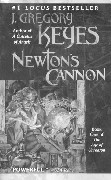 Newton's
Cannon
Newton's
Cannon
by J. Gregory Keyes
A book review by Mark L. Olson
Del Rey, 1998, 368 pp., $6.99
Isaac Newton -- probably the greatest physicist ever -- was also passionately interested in alchemy and spent a considerable amount of time on it. (This is often portrayed as Newton in his dotage, but when he lived a reasonable man could still believe that alchemy might yet be understood and reduced to a rational set of principles.)
What if Newton had succeeded?
In Newton's Cannon, he discovers the critical laws of alchemy in his middle age and by the time he is an old man in the early 1700s, and alchemical revolution has swept across Europe. But this is a Europe where the old wars are still going on -- Louis XIV still hopes to conquer all of Europe and Britain still opposes him.
In this book (the first of three or more) we follow the very young Ben Franklin experimenting with alchemy in Boston and several French researchers trying to build a weapon wherein France can destroy Britain.
At the same time, there appears to be meddling going on by beings who in some fashion dwell in an alchemical realm - or, at any rate, only can interact with us through indirect effects based on alchemy.
Newton's Cannon is very well done. It appears that Keyes understands the history of the period, so people's and nation's motivations are reasonable and the general setting is top notch.
It's a good story which is just begun here.
See my review of the other books in the series: Newton's Cannon, A Calculus of Angels, and Empire of Unreason and Shadows of God
NESFA homepage | Review Index | More Reviews by Mark L. Olson
